Heading out the door? Read this article on the new Outside+ app available now on iOS devices for members! Download the app.
Climbing officially began its march toward the 2024 Paris Olympics with the conclusion of the recent World Championships. Over the course of 12 days in Bern, Switzerland, more than 400 competitors from 54 different countries participated in four different disciplines, ultimately coming to a crescendo with 10 Olympic berths. The proceedings were, at times, inspiring and transcendent, while also occasionally devolving into a mess of bottlenecks and requisite math.
There’s a lot of highlights to unpack, but we’ll recap all the action here, in order to get you caught up as the Olympic momentum (and press, promotion, etc.) gets ready to hit Mach speed. [Editor’s Note: For a full recap of the Paraclimbing World Championships, which also took place in Bern, click here.]
Mawem and Garnbret Rule in Boulder Battles
The World Championships began with a boulder discipline parceled out to qualification, semi-final, and final rounds—standard IFSC format. The individual boulder discipline (and the lead discipline, for that matter) did not directly result in Olympic berths, but the results of these individual disciplines informed the roster for a separate, combined boulder-and-lead discipline that did lead to Olympic invitations. (More on that combined discipline—and the resultant Olympic berths—below.)
The biggest talking point early in the men’s boulder discipline was not the long road ahead or the forthcoming Olympic invitations, but the initial dominance of Japan’s 16-year-old phenom, Sorato Anraku. He rolled through the men’s qualification round by topping everything the routesetters concocted, and he maintained strong form by reaching the top of all the boulders in the semi-finals too. Some other competitors—France’s Mickael Mawem and Mejdi Schalck, Japan’s Kokoro Fujii, and South Korea’s Dohyun Lee—secured three tops in the semi-finals to keep some pressure on Anraku, but the pervasive feeling was that Anraku was beginning a slow march to World Championship gold.
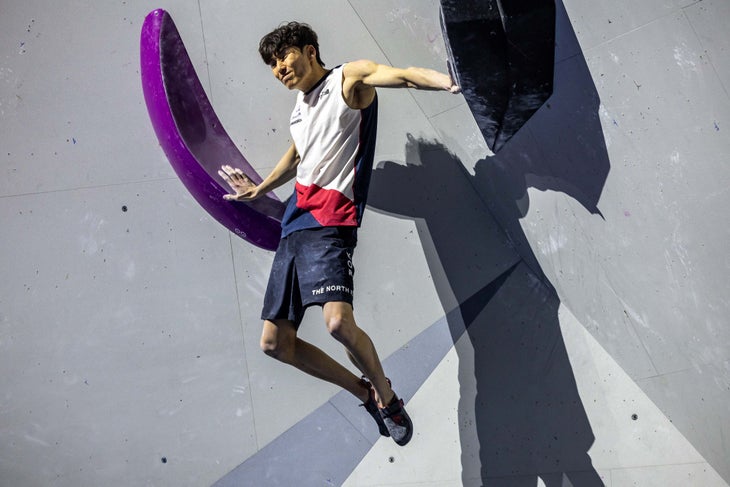
This remained the case in the boulder final round, especially when Anraku boldly skipped a thumb jib on the penultimate hold of the round’s first boulder—a direct method to the top that roused the crowd. Yet, just as Anraku’s victory started to feel like an inevitability, he struggled to find stable footing on a trot across some geometric volumes on the final round’s third boulder. Even when Anraku finally dialed in the balancey, low sequence with less than a minute of his allotted time remaining, he could not perform the necessary crowd-facing dynamic press crux. This left an opening for the competitor situated in second place—France’s Mawem—to take the lead, which he soon did by topping this cruxy third boulder. Upon reaching the zone hold on the round’s last boulder a few moments later, Mawem was awarded the gold medal. (Anraku struggled on this last boulder too, eventually dipping into fourth place, while France’s Schalck clenched the zone to earn the silver medal, and South Korea’s Lee earned the bronze.)

Mawem’s boulder victory was immediately lauded for a number of reasons. Not only was it a come-from-behind win, but Mawem was also statistically an underdog, never having been a consistent name on World Cup podiums—in fact, it has been five years since Mawem has advanced to a World Cup final round. At 33 years old, Mawem was also the oldest finalist in the World Championships boulder field. For all those reasons, it is likely his win will go down in history as one of the most thrilling the sport has ever seen.
The women’s boulder discipline was thrilling in its own way—not because it featured surprising leaderboard changes or a great underdog narrative, but because it showcased the unabashed supremacy and consistency of Slovenia’s Janja Garnbret. Garnbret was the only woman to reach the top of all qualification boulders, and this was just the beginning of her masterclass. In the semi-final round that followed, she flashed all four boulders. Continuing the trend, she flashed all four boulders in the final round as well to win the gold medal in decisive fashion.
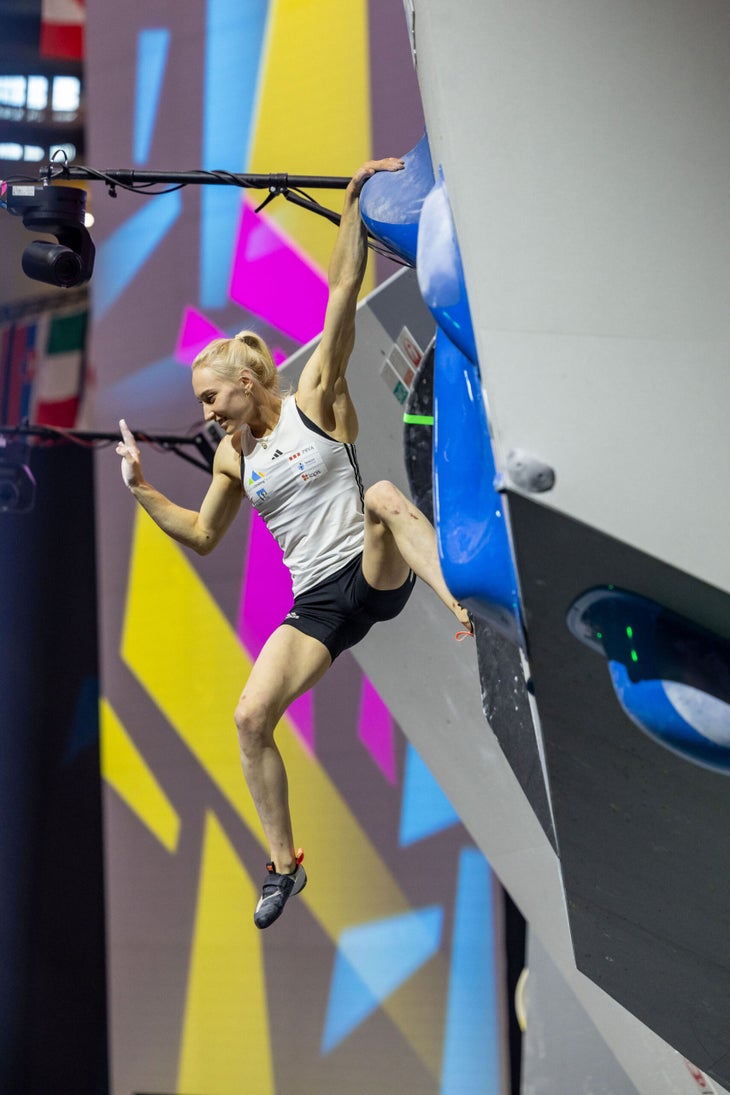
Garnbret would eventually cite the ascent of the final round’s second boulder—a slab—as her favorite moment of the competition, as she could not train on slabs while recovering from a fractured toe earlier this season. But analysis of Garnbret’s World Championship win should not be parceled out to any specific boulder; rather, it should be seen as a momentous whole; she never fell throughout the entirety of the semi-final and final round. Garnbret’s performance was perhaps the most dominant ever seen at a World Championships. Credit is due to the silver medalist, France’s Oriane Bertone (who secured three tops in the final round), and the bronze medalist, USA’s Brooke Raboutou (who secured two flashes in the final round); together, Bertone and Raboutou forced Garnbret to stay laser-focused and proficient on all blocs.
Mori and Schubert Reign in Wild Lead Finals
Garnbret looked equally as dominant in the early portion of the lead discipline, leading the women’s qualification round with USA’s Raboutou, Japan’s Ai Mori, and South Korea’s Chaehyun Seo chasing her on the scorecards.
But the gap between the competitors narrowed in the women’s semi-finals. For instance, Raboutou cranked through a crux of yellow “banana” volumes in the semi-finals’ mid-section in order to establish a high point near the lip of the headwall late in the round. Japan’s Mori, climbing moments later, ascended much higher onto the headwall and pumped out while attempting to mantle for the top. Garnbret was able to pull onto the headwall too, but she worked herself into a makeshift crux when she climbed too far past a comfortable clipping point—and fell while trying to backtrack and make the clip. As a result, Garnbret was not able to surpass Mori on the semi-finals’ scorecards.
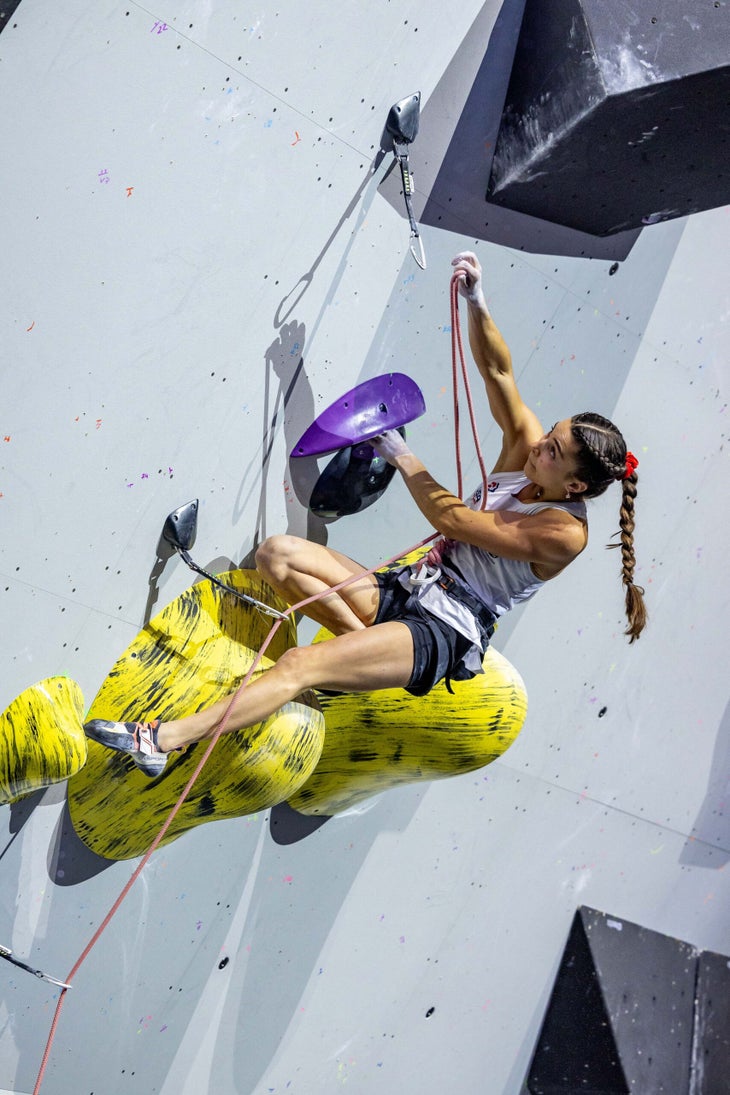
In the lead final round, a number of competitors struggled to match a high point set by South Korea’s Seo on the headwall. Even Garnbret encountered some woes fairly low on the wall, especially in a compression sequence on a large, black “refrigerator” volume. But displaying veteran awareness of the ticking clock, Garnbret quickened her climbing pace and eventually topped the route with only three seconds of allotted time remaining. However, Garnbret’s elation was short-lived because Mori—climbing last—cruised to the headwall too, breezed through some obligatory cross moves, and clipped the chains at the top too. With both Mori and Garnbret having topped the finals’ route, the gold medal was determined by countback to the semi-finals; therefore, Mori was awarded the gold, Garnbret earned the silver, and Seo earned the bronze. The dual tops in the finals was a fairly unsatisfactory way for a World Championship discipline to end, but that should not detract from Mori’s victory—or the fact that fans were given yet another chapter in the multi-year saga of Garnbret battling Mori.
In the men’s division of the lead discipline, Austria’s Jakob Schubert was adding to his own multi-year saga, of sorts. He took a narrow lead in the qualification round over Japan’s Anraku, dipped slightly on the scorecards in the semi-finals as Great Britain’s Toby Roberts blazed high onto the headwall, and then surged back into first-place position in the finals. Schubert eventually timed out in the finals while reaching for a new high point of 48+, a partial point higher than Anraku’s score of 48. The Czech Republic’s Adam Ondra, a favorite to win the event, had a chance to best Schubert’s score, but Ondra barn-doored off the finals route surprisingly low while reaching for an angled right-hand hold. Great Britain’s Roberts also seemed primed to chase down Schubert’s high point, but Roberts fell low too while setting up for a dyno. As a result, Schubert’s high point equated to a gold medal, with Anraku getting the silver and Germany’s Alex Megos earning the bronze. The accolade was Schubert’s tenth World Championships medal, an incredible collective achievement that spans multiple disciplines and dates back to 2011.
Hunt, Zurloni, and Others Punch Olympic Tickets in Speed
The qualification round of the speed discipline featured familiar names at the top of the standings: Indonesia’s Veddriq Leonardo in the men’s field and Aleksandra Miroslaw in women’s field, each of whom hold the world records in their respective divisions. But the normalcy of the early standings belied the shocks and upsets that were to come.
In the finals for the men’s division, Leonardo was knocked out of medal contention early when an uncharacteristic slip resulted in a loss to Spain’s Erik Noya Cardona. That same round, Italy’s Matteo Zurloni missed the buzzer in a race against France’s Bassa Mawem but managed to hang on to the top hold and launch for the buzzer a second time—a savvy move that resulted in a narrow win for Zurloni at 6.36 seconds. In the ensuing match-ups on the elimination bracket, Zurloni beat China’s Peng Wu in a close race, and then bested Indonesia’s Rahmad Adi Mulyono (the eventual bronze medalist) to earn a coveted Olympic invitation. The other Olympic berth went to China’s Jinbao Long after he set a personal best time of 5.03 seconds in a victorious race against Kazakhstan’s Rishat Khaibullin. This set up a Big Final race between the two athletes that had earned the Olympic invites—Italy’s Zurloni and China’s Long. The Big Final race itself did not deliver fireworks—Jinbao Long false-started, making Zurloni the gold medalist by default. But the Olympic bids overshadowed everything, and the results felt special despite the disappointing finish.
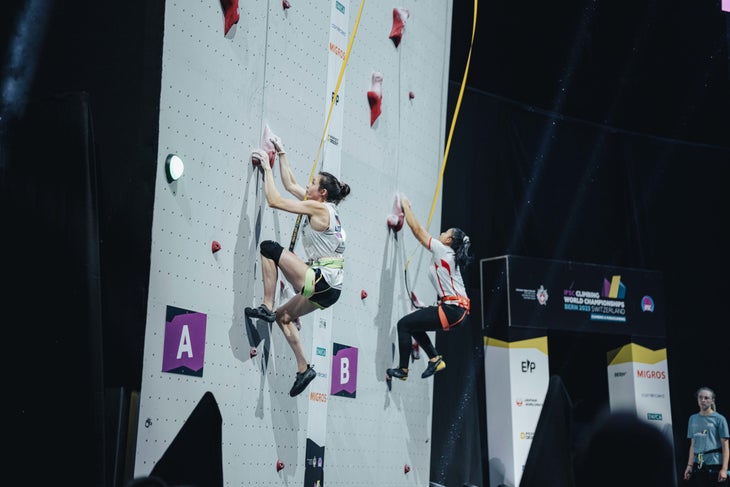
The finals for the women’s division also featured some upsets, such as Spain’s Leslie Adriana Romero Pérez having “the run of her life” to beat China’s Lijuan Deng, and Poland’s Natalia Kalucka slipping low on the wall in a loss to China’s Yafei Zhou. But by far the biggest shock of all came when Poland’s Miroslaw—the heavy favorite to win the gold medal—slipped in a race against the USA’s Emma Hunt. Hunt won the race—and earned an Olympic berth—while commentator Matt Groom proclaimed about Miroslaw’s costly mistake, “That is what pressure can do!” The other competitor to earn an Olympic invite in the women’s Speed division was Indonesia’s Desak Made Rita Kusuma Dewi, who did so by beating Poland’s Aleksandra Kalucka in the women’s 1/2 Final. Shortly thereafter, Hunt and Dewi found themselves facing off in the Big Final, with Dewi ultimately winning the gold medal with a run time of 6.49 seconds. In earning the silver medal, Hunt still managed to clock a best-ever American time—6.67 seconds. And the fact that there could be a rematch of Hunt vs. Dewi at the Paris 2024 Olympics is already giving speed aficionados goosebumps.
Combined Discipline Creates Intrigue for Paris Olympics
The starting lineup for the combined (boulder and lead) discipline was determined by a point system, with many of the names being familiar standouts from the separate disciplines. For example, Slovenia’s Janja Garnbret, Japan’s Ai Mori, and USA’s Brooke Raboutou sat atop the initial women’s standings based on points. It took a while for the women’s field to slip into a rhythm during the combined semi-finals—with the first top of the round not happening until more than an hour into the livestream. But once Garnbret’s attempts came, she maintained her lead in the standings by topping every semi-finals boulder and then reaching the headwall on the lead route.
Garnbret proved equally proficient in the combined finals by flashing the round’s inaugural boulder, a leftward progression on blue slopers. However, the big story of the bouldering portion was that of Austria’s Jessica Pilz, who secured tops of the first two boulders, and then earned low and high zone holds on the third boulder. (Yes, you read that correctly—the combined discipline features two zone holds on each boulder, worth a maximum of five points and ten points, respectively.) Pilz’ eventual bouldering score of 69.0 wasn’t quite enough to overtake Raboutou’s score of 69.8 or Garnbret’s score of 84.9, but it was enough to heighten the drama for the ensuing lead portion.
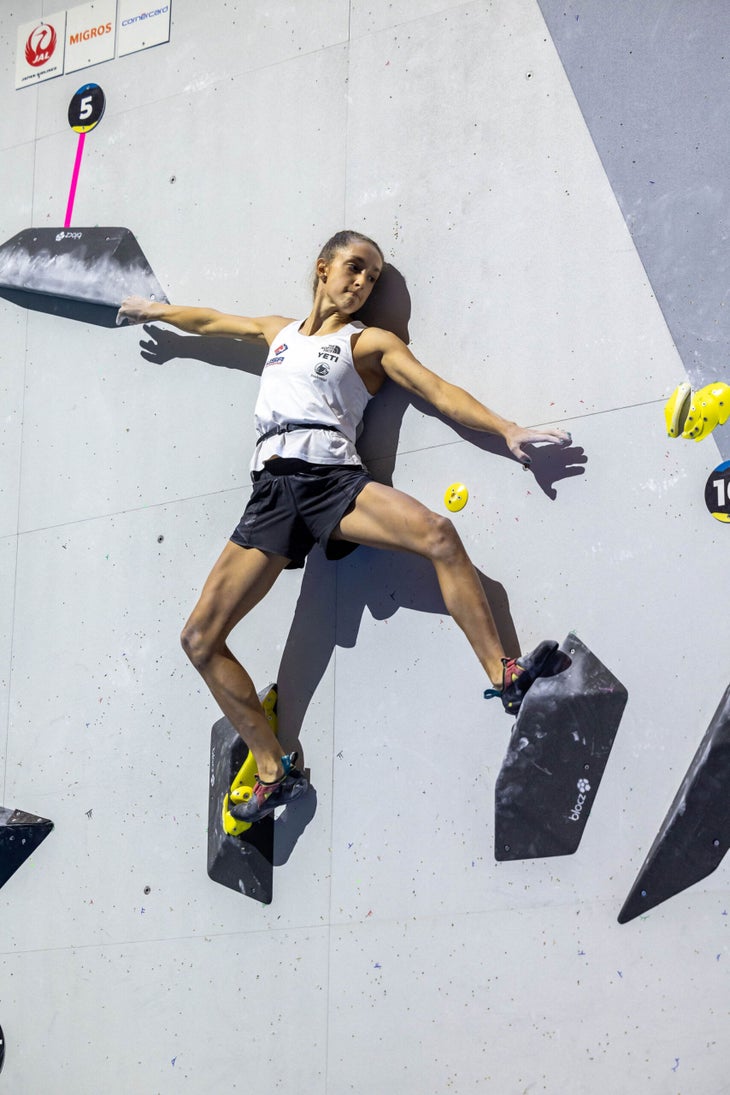
On the lead route, Pilz fell with a score of 88.1, just beneath a high point set on the headwall by South Korea’s Jain Kim. Raboutou climbed moments later and also rocketed to the headwall before succumbing to a left-hand slip in a tiring overhead position. Japan’s Mori was able to fight for an even higher hold on the headwall, and fell only when launching for the top. Garnbret, climbing last, had a chance to top the route as well, but a left-foot slip (with a lead score of 92.1) ended her chances before she could reach Mori’s high point. Still, with a cumulative (boulder and lead) score of 177 out of a possible 200, Garnbret’s attempt on the lead route resulted in a gold medal for the combined discipline, along with a ticket for the Paris Olympics. Pilz earned the silver medal and Mori earned the bronze—and both earned Olympic invitations as well. Raboutou’s combined score was only 2.8 points below Mori’s, ensuring that Raboutou will be among the favorites at the next Olympic qualification event.
The leader for the early stages of the men’s combined discipline was Japan’s Sorato Anraku, anchored by a strong showing on the semi-finals’ boulders and a top of the semi-finals’ lead route. But Anraku struggled early in the combined finals and was not able to match at the top of a powerful first boulder. The remainder of the boulders were slightly undercooked and created a surplus of tops. However, shining above the rest of the field were Japan’s Tomoa Narasaki and Austria’s Schubert, who both ascended all four boulders of the round. Schubert pulled away from the field even more during the lead portion, progressing to the headwall before falling during a left-hand lunge to a crimp.
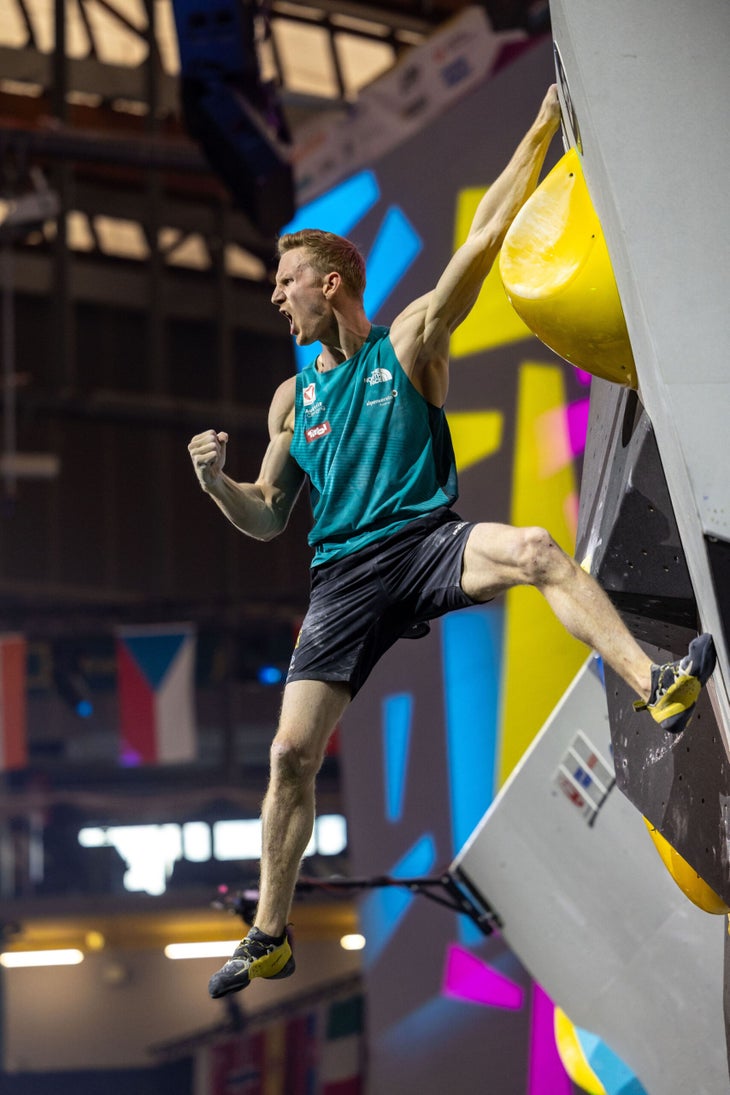
Narasaki was not able to reach the headwall on his attempt, but he still posted a robust total score. USA’s Colin Duffy, too, couldn’t overtake Schubert’s high point, but amassed a cumulative—boulder and lead—total that kept Duffy in the mix. In many ways, the men’s combined final came down to the lead attempts of Great Britain’s Toby Roberts and Japan’s Anraku, but they each ultimately fell just above the lip of the headwall—too low to disrupt the preliminary podium. As a result, Schubert’s combined score of 183.6 resulted in a gold medal (and an Olympic ticket); Duffy earned the silver, and Narasaki earned the bronze—each receiving Olympic berths as well.
There were a lot of other anecdotes, notes, and takeaways, so let’s riff off some of them here as Highs and Lows.
Highs
Matt Groom and Shauna Coxsey made for a fantastic commentary team. I’d love to see them become a regular commentary pairing on the World Cup circuit.
There were some great camera shots of the crowd inside the PostFinance Arena, and the best part was seeing all the homemade signs, flags, and banners that fans were waving as they cheered. I think a lot of the audience’s energy might have dissipated up and into the ether if the event had been held outdoors. Luckily all the passion seemed to be hermetically sealed inside the venue and directed toward the climbers on the main stage.
In a post-event press conference, Janja Garnbret dedicated her boulder gold medal to rescue workers currently aiding in flood relief around Slovenia. Shortly thereafter, she stated on Instagram that she’d be donating her World Championship earnings to Slovenia’s recovery from the natural disaster.
I’m intrigued by the clear no-tex holds that were unveiled at these World Championships. I think they could be really fun additions to routes and boulders in seasons to come, if Flathold decides to produce more than just this limited batch.
Emma Hunt will go down in history as the first climber to qualify for the Paris 2024 Olympics. More specifically, Hunt will also go down in history as the first-ever climber to qualify for the individual Speed discipline, while Jessica Pilz will go into the history books as the first-ever climber to qualify for the Paris 2024 combined (boulder and lead) discipline. Very cool.
There were so many thrilling displays of tenacity throughout the entire championships. Undoubtedly there were a lot of crushed dreams and broken hearts too when Olympic qualification goals were not met. But knowing that many more Olympic berths will be awarded in events to come is very exciting, as is the knowledge that the fields for those events will be epically stacked.
Lows
The first boulder in the women’s final (boulder) round probably served a purpose of captivating some casual viewers. It featured an outward-facing start and a burly progression out of a cave—a clear demonstration of sheer power from all competitors. But it was massively undercooked, as all six finalists flashed it. Definitely the dud of the event.
While we’re on the subject of the women’s boulder final, the clock got stuck during Oriane Bertone’s attempt on the third boulder. So, Bertone was forced to take a five-minute pause during her attempts while the timing issues got resolved. This could have been a much greater calamity than it ended up being. Fortunately, once the clock was fixed, Bertone topped the boulder with ease and the issue was basically forgotten.
One of the biggest surprises of the competition was a very low foot slip from Japan’s Yoshiyuki Ogata in the men’s lead semi-finals, and the resultant score of 6. This was a bummer because not only is Ogata a fan-favorite, but he is also a lead powerhouse, evidenced by a fourth-place finish at the World Cup in Briançon earlier this season.
Janja Garnbret was not the only competitor to get somewhat stymied by a clipping position, as she did in the lead semi-finals. Italy’s Stefano Ghisolfi cruised through a campusy pocket section on the men’s semi-final lead route—but inadvertently missed a clip along the way. He tried to resolve the issue, but pumped out while trying to backtrack to the draw. Unfortunately, the mistake ended up ruining his attempt, and his concluding score of 26 was too low for advancement into the lead finals.
Results
Men’s Combined (* = Olympic invitees)
- Jakob Schubert (AUT)*
- Colin Duffy (USA)*
- Tomoa Narasaki (JPN)*
- Sorato Anraku (JPN)
- Toby Roberts (GBR)
- Adam Ondra (CZE)
- Dohyun Lee (KOR)
- Paul Jenft (FRA)
Women’s Combined (* = Olympic invitees)
- Janja Garnbret (SLO)*
- Jessica Pilz (AUT)*
- Ai Mori (JPN)*
- Brooke Raboutou (USA)
- Jain Kim (KOR)
- Oriane Bertone (FRA)
- Miho Nonaka (JPN)
- Annie Sanders (USA)
Women’s Speed (* = Olympic invitees)
- Desak Made Rita Kusuma Dewi (INA)*
- Emma Hunt (USA)*
- Aleksandra Miroslaw (POL)
Men’s Speed (* = Olympic invitees)
- Matteo Zurloni (ITA)*
- Jinbao Long (CHN)*
- Rahmad Adi Mulyono (INA)
Women’s Boulder
- Janja Garnbret (SLO)
- Oriane Bertone (FRA)
- Brooke Raboutou (USA)
- Zélia Avezou (FRA)
- Natalia Grossman (USA)
- Ai Mori (JPN)
Men’s Boulder
- Mickael Mawem (FRA)
- Mejdi Schalck (FRA)
- Dohyun Lee (KOR)
- Sorato Anraku (JPN)
- Nicolai Uznik (AUT)
- Kokoro Fujii (JPN)
Women’s Lead
- Ai Mori (JPN)
- Janja Garnbret (SLO)
- Chaehyun Seo (KOR)
- Mia Krampl (SLO)
- Brooke Raboutou (USA)
- Jessica Pilz (AUT)
- Laura Rogora (ITA)
- Miho Nonaka (JPN)
- Molly Thompson-Smith (GBR)
Men’s Lead
- Jakob Schubert (AUT)
- Sorato Anraku (JPN)
- Alex Megos (GER)
- Dohyun Lee (KOR)
- Ao Yurikusa (JPN)
- Paul Jenft (FRA)
- Sean Bailey (USA)
- Adam Ondra (CZE)
- Toby Roberts (GBR)
- Yunchan Song (KOR)
